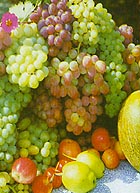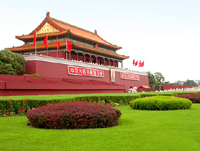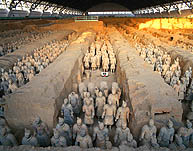_Wine Tour To China
 ---History
of Grape Wine in China ---History
of Grape Wine in China
Grape cultivation and wine making in China are not new, having
being established before the Han Dynasty (206BC - 220AD).
Indeed in 138BC, Emperor Han-wu sent an envoy to the western
part of China (Xinjiang region) who reported back "the
Wan people made wine with grapes, drank wine on a regular
basis, indeed wine was their most popular alcoholic drink.
The rich people stored more than ten thousand `dan' (about
300,000 liters) of wine which could be kept for about ten
years."
The envoy learned the techniques of planting grapes and winemaking,
which he brought back to the Emperor and soon the growing
of grapes and winemaking for the Imperial Palace at Xian in
Shaanxi province was developed on a large scale.
The next period of interest in wine was during the Yuan Dynasty
(1271-1368). The rulers, the Mongols, of the Yuan Dynasty
were very fond of wine, and stipulated that people must use
wine when they offered a sacrifice at a temple. The scale
of wine production in China reached its highest point during
the Yuan dynasty. The traditional wine center of the western
region of Xinjiang was supplemented by production in Taiyuan,
Shanxi province and Nanjing in Jiangsu province.
----Wine Development Today
in China
¡¤ GREAT WALL: Possibly China's best-known brand,
located in Zhangjiakou, in Hebei province, owning a 750,000-m2
vineyard at Shacheng. Total production is about 50,000 tons
per annum, spread amongst seven different types. Of this about
1,500 tons are exported annually - just under 50% of China's
total wine exports. Established in 1983.
¡¤ ZHANGYU: Zhangyu is the largest wine manufacturer
of Asia, with employees of 4,000, total assets of 2.29 billion
RMB, annual capacity of 80,000 ton. Products are exported
to Malaysia, America, Holland, Belgium, Korea, Thailand, Singapore,
Hong Kong and elsewhere.
¡¤ HUADONG: Established in 1985, has a total
of 5 vineyards of 10 million m2 in Shandong, close to Qingdao.
Annual production capacity is 60,000 ton, specializing in
white wine varieties, with a very good Chardonnay.
Day 1 - Beijing 
Arrival into Beijing in the morning. Transfer from Airport
to Hotel. After lunch, we start our tour from Tiananmen Square,
the world largest square, bordered by the Great Hall of the
People, Mao's Mausoleum and the National Museum of China.
This will be followed with a walk to the Forbidden City, the
complex of imperial palace that was home to the Chinese Emperors
for over 500 years. Sited on 72 hectares of land with 9000
rooms covering a floor space of 150,000 square meters. Grand
halls and courts gradually give way to more intimate domestic
quarters, giving an insight into the pampered isolation of
the emperors. Evening Beijing Acrobatic Show. Overnight Jianguo
Hotel.
Day 2 - Beijing
We drive 2 and half hours to a suburban county, visiting a
Chinese famous Wine Company Ltd. It is a Sino-foreign joint
venture, which specializes in manufacturing and marketing
various types of wine. The company was set up in 1983 and
has registered capital of US$2.3 million and fixer assets
of US$10 million. The facilities have an annual capacity of
10,000 tons of products. The company uses modern wine producing
equipment imported from France, Germany and Italy. It has
1375 twenty-ton storage vessels capable of holding 30,000
tons. The company itself has 70.3 hectare of vineyards where
over ten different world famous varieties of wine grapes are
grown, each of which can be used to produce single variety,
high quality wines. The company is in an area which boasts
an abundant supply of high quality Dragon Eye grapes, representing
a good supply of raw material for use in wine making. Evening
Peking Duck banquet. Overnight Beijing
Day 3 - Beijing / Yantai
Today should be one of the highlights of China tour, No visit
to China would be complete without seeing the Great Wall.
The climbing of the Great Wall of China which was first built
in the Warring States period (475-221 BC) as a series of earthworks
erected by individual kingdoms as a defense against each other
as well as from invasions from the north. Its main objective
was to keep out Genghis Khan and the Mongolian hordes. This
proved only partially successful. The present day wall was
left from the Ming dynasty and it represents one of the wonders
of the world. After this excursion, we take evening train
(Soft Sleeper) to Yantai. Shandong Province. Overnight in
the Train.
Day 4 - Yantai
Arrive in Yantai at 7:00am, we first check in our 4 star hotel
and have a breakfast. At 10:00am, we drive to visit Zhangyu
Wine Company. Yantai is the birthplace of China's modern wine
industry. Oversees compatriot Zhang Bishi established this
famous Wine Company as far back as 1892 in the city, and in
1992, Zhangyu's 100th anniversary, the city was named by the
International Wine Organization as "International Grape
and Wine City." Yantai's Zhangyu, Beijing's Great Wall
and Tianjin's Dynasty - the three stars in China's red wine
market - are wineries with an output value exceeding Rmb100
million (HK$94.3 million). Together they control 50.6% of
the market. Their sales and profits make up 61.9% of the total
industry, with the remaining market largely shared by newly
emerging wineries. April 2004 statistics make Zhangyu the
market leader, followed by Great Wall and Dynasty. After visiting,
we will have a technical interview with company's experts
to exchange views and followed by an easy city tour. Overnight
Yantai
Day 5 - Yantai / Qingdao
(Tsingdao)
After breakfast, we take a bus 3hours to Qingdao, an old port
city situated on the Southern coast of Shandong, is a quaint
and popular spot for sun seekers alike, and Qingdao Beer is
famous all over China. With a total area of 10.645 square
km and a total population of 6.95 million (2.27 million in
the urban district), Qingdao is in fact one of China's most
important economic cities and is the nation's fourth largest
port. Besides, the German influence in Qingdao extends beyond
impressive architecture to many other areas; from town planning,
creating lush wooded avenues and some of China's best parks,
to local customs. Of particular interest to many of her visitors
is, of course, the Tsingdao beer, produced locally from the
pure Laoshan water, and whose origins lie in the first brewery,
established in 1903. For those so inclined, the Beer festival
(August 12-26) is a great time to visit. We will visit the
another famous Winery, the first joint venture in China to
produce varietal dry white and red wines in accordance with
international beverage standards. This operation is at the
leading edge of China's plan to become a wine-producing country.
Established in 1985, it produces the only varietal vintage
wine in the country, and the only wine to win medals in European
competitions and its wine is found across the country in all
the finest international and luxury hotels and are qualified
to use the Chinese "Green-Food" mark. Overnight
Qingdao.
Day 6 - Qingdao / Xian
In this morning we fly to Xian. After arrival, we have a city
tour including visit of the old City Wall. Be preparing for
some surprises. This afternoon one of the highlights of the
tour is a visit to the buried army of Emperor Qin Shi Huang.
This 2180-year-old terracotta army of more than 800 soldiers
was discovered in 1974. On the way, we visit a peasant village
where we talk to some farming families about their enterprises,
growing grain crops, kiwifruit and pomegranate orchard and
visit their homes. See Tang Dynasty show with dinner in the
evening. Overnight in Xian
Day 7 - Xian
After breakfast, we drive 2 and half hours to rural County
to visit one of the oldest Chinese winery, It was founded
in 1911 because of a suggestion and help from an Italian Missionary
when he passed by here and found the local high quality grapes.
Now it has a 17,000-ton capacity, fixed assets of US$1.9 million,
total assets of US$ 3.6 million and a staff of 400. Some wine
producing equipment imported from France and Argentina since
1990s. Its leading products include 20 wines of high, medium
and low grades, of which Tianyun dry red wine and the dry
white wine are well sold all over China. The company has 1250
hectare of vineyards covering 8 townships and 59 villages,
with total production of different grapes 3 million KG. After
visiting we have a meeting with local officials and experts
from the company and vineyards. In the afternoon we drive
back to Xian, on the way, we may visit some other crops farm.
Overnight Xian
Day 8 - Xian / Shanghai
Take morning flight to Shanghai. A city of 12 million people
and an important center for trade and industry in China. On
arrival a city sights tour including Nanjing Road, one of
the busiest and biggest shopping street in China. Stroll on
the Bund, Shanghai's famous waterfront. We will visit the
Yu Garden, which is characteristic of the architectural style
of the Ming dynasty. It is a private garden in the southeast
of Shanghai, with a history of 400 years. The garden features
more than 30 halls and pavilions. Outside the Yu Garden there
is very interesting market with every thing that you can think
of for sale at low price. Overnight Shanghai.
Day 9 Shanghai / Back home
Our Quotation includes:
1. Two domestic flight tickets and airport taxes, one train
ticket
2. Air-conditioned private deluxe transportation within the
tour
3. Accommodation at four-star international standard Hotel
with all western buffet breakfast in the hotels. All meals
as specified in the itinerary
4. Comprehensive sightseeing, visits as shown in the itinerary,
including English-speaking national guide, local English-speaking
guides in each city and all entrance fees
5. Performances tickets as listed in the itinerary
6. All technical visits
|





